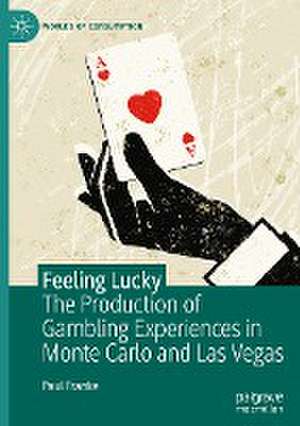Feeling Lucky: The Production of Gambling Experiences in Monte Carlo and Las Vegas: Worlds of Consumption
Autor Paul Frankeen Limba Engleză Hardback – 14 iul 2023
Monte Carlo and Las Vegas have become synonymous with casino gambling. Both destinations featured it as part of a broad variety of leisure and consumption opportunities that normalized games of chance and created emotional atmospheres that supported the hedonistic aspects of gambling. Urban spaces and architecture were carefully designed to enable a rapid growth of the casino industry and produce experiences on previous unimaginable scale. Feeling Lucky, is a “making of story,” about cities which acquired a strange and captivating allure of mystery around them. It is more than a mere descriptive account, however. Combining urban history, the history of consumption, and sociological approaches it presents a compelling comparative history of Monte Carlo and the Las Vegas Strip between the 1860s and 1970s.
Paul Franke takes the reader on a journey from arriving at the cities, through the carefully planned urban environments and into the famous casinos. The analysis follows the paths contemporary gamblers would have taken, right to the gambling tables and to the shifting gambling practices across a century. Franke shows that casino entrepreneurs succeeded in producing and selling gambling experiences by controlling spaces, adapt leisure practices and appeal to specific markets. Gamblers on the other hand regarded Monte Carlo and Las Vegas as places to engage in games of chance that would allow them to preserve their political, cultural, and moral identities.
Paul Franke takes the reader on a journey from arriving at the cities, through the carefully planned urban environments and into the famous casinos. The analysis follows the paths contemporary gamblers would have taken, right to the gambling tables and to the shifting gambling practices across a century. Franke shows that casino entrepreneurs succeeded in producing and selling gambling experiences by controlling spaces, adapt leisure practices and appeal to specific markets. Gamblers on the other hand regarded Monte Carlo and Las Vegas as places to engage in games of chance that would allow them to preserve their political, cultural, and moral identities.
Preț: 783.20 lei
Preț vechi: 955.11 lei
-18% Nou
Puncte Express: 1175
Preț estimativ în valută:
149.88€ • 162.75$ • 125.90£
149.88€ • 162.75$ • 125.90£
Carte tipărită la comandă
Livrare economică 23 aprilie-07 mai
Preluare comenzi: 021 569.72.76
Specificații
ISBN-13: 9783031330940
ISBN-10: 3031330943
Ilustrații: XVIII, 253 p. 7 illus.
Dimensiuni: 148 x 210 mm
Greutate: 0.48 kg
Ediția:2023
Editura: Springer International Publishing
Colecția Palgrave Macmillan
Seria Worlds of Consumption
Locul publicării:Cham, Switzerland
ISBN-10: 3031330943
Ilustrații: XVIII, 253 p. 7 illus.
Dimensiuni: 148 x 210 mm
Greutate: 0.48 kg
Ediția:2023
Editura: Springer International Publishing
Colecția Palgrave Macmillan
Seria Worlds of Consumption
Locul publicării:Cham, Switzerland
Cuprins
1. Introduction.- 2. Building Paradise – City Spaces and the production process of consumption experiences.- 3. Consumption Spaces – Building Casinos and producing Experiences in Monaco.- 4. The Las Vegas Strip: Creating and Selling the American Gambling Experience.- 5. The Right Crowd: Exclusion and the Moral Economy of Casino Gambling.- 6. Working in the Casinos, how Casinos work – Careers and Professional Biographies as the Basis of Producing the Consumption Experience.- 7. The Production of Consumption Experiences through Gambling Practices.- 8. Happy Losers, Happy Consumers – Gamblers as Consumers of Experiences.- 9. Conclusion: Casinos, Consumption and Capitalism.
Notă biografică
Paul Franke is an Assistant Professor at the Philipps University Marburg and Associated Researcher at Centre Marc Bloch, Germany. He specializes in the cultural history of markets and economies, urban history, and the history of gambling.
Textul de pe ultima copertă
Monte Carlo and Las Vegas have become synonymous with casino gambling. Both destinations featured it as part of a broad variety of leisure and consumption opportunities that normalized games of chance and created emotional atmospheres that supported the hedonistic aspects of gambling. Urban spaces and architecture were carefully designed to enable a rapid growth of the casino industry and produce experiences on previous unimaginable scale. Feeling Lucky, is a “making of story,” about cities which acquired a strange and captivating allure of mystery around them. It is more than a mere descriptive account, however. Combining urban history, the history of consumption, and sociological approaches it presents a compelling comparative history of Monte Carlo and the Las Vegas Strip between the 1860s and 1970s.
Paul Franke takes the reader on a journey from arriving at the cities, through the carefully planned urban environments and into the famous casinos. The analysis follows the paths contemporary gamblers would have taken, right to the gambling tables and to the shifting gambling practices across a century. Franke shows that casino entrepreneurs succeeded in producing and selling gambling experiences by controlling spaces, adapt leisure practices and appeal to specific markets. Gamblers on the other hand regarded Monte Carlo and Las Vegas as places to engage in games of chance that would allow them to preserve their political, cultural, and moral identities.
Paul Franke is an Assistant Professor at the Philipps University Marburg and Associated Researcher at Centre Marc Bloch, Germany. He specializes in the cultural history of markets and economies, urban history, and the history of gambling.
Caracteristici
Conceptualizes gambling as both a service and an experience Demonstrates how vice was transformed into a legitimate leisure activity Compares the tactics different casinos used to create and exploit consumer habits











